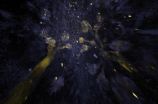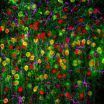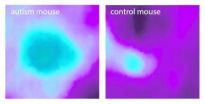(Press-News.org) When goalkeepers are pitted against multiple kickers in tense penalty shootouts, their attempts to dive for the ball show a predictable pattern that kickers would do well to exploit. After kickers repeatedly kick in one direction, goalkeepers become increasingly likely to dive in the opposite direction, according to an analysis of all 361 kicks from the 37 penalty shootouts that occurred in World Cup and UEFA Euro Cup matches over a 36-year period.
The findings reported in the Cell Press journal Current Biology on July 31 highlight the importance of monitoring and predicting sequential behavior in real-world competition, according to the researchers, a lesson that could be applied to many areas of life.
"Cognitive fallacies can affect all of us, even if we are considered expert performers in a particular field," says Patrick Haggard of the University College London. "It is important to try to be aware of situations in which we may be vulnerable to bad decision making. Then we may be able to avoid making mistakes."
For example, Haggard and Erman Misirlisoy say, at a casino roulette table it's not a good idea to place a big bet on black simply because there have been several reds in a row. Previous events aside, red and black are always equally likely. The natural tendency to suspect otherwise is known as "gambler's fallacy."
Haggard and Misirlisoy are generally interested in how people make decisions, and they recognized soccer and other sports as great examples of competitive cognitive strategies at work.
"In a penalty shootout, a goalkeeper and a group of kickers do their best to outwit each other," Misirlisoy says. "How they control their behavior gives an insight into cognitive strategies more generally. Just as a kicker and a goalkeeper need to decide between kicking left or right and diving left or right, we often find ourselves in life making decisions between two roughly balanced options, such as two alternative routes to where we want to go."
As is often the case in sports, goalkeepers can't wait until the ball has been kicked to dive or they'll miss it every time. They simply have to guess. The best strategy for both goalkeepers and kickers is to behave unpredictably, diving and kicking in random directions.
The researchers' analysis of penalty shootouts shows that even the very best goalkeepers in the world suffer from a cognitive fallacy in selecting which way to dive next, making their next move more predictable than it really should be. Fortunately for those goalkeepers, kickers failed to exploit those goalkeeper biases, the researchers found.
What's a goalkeeper to do? Misirlisoy suggests that it might be good strategy to decide on a random sequence of dives before the game and follow that sequence regardless of what kickers do. Until that day comes, kickers could learn to predict which way goalkeepers might dive.
For the researchers, the work left them experiencing this year's World Cup series in a whole new way. "We found we were thinking about behavioral decision making as much as about the entertainment," Misirlisoy says. "We were trying to predict which way the goalkeeper would dive, and we didn't pay much attention to how many times the ball ended up in the net."
INFORMATION:
Current Biology, Misirlisoy et al.: "Asymmetric predictability and cognitive competition in football penalty shootouts."
In high-stakes soccer, goalkeepers exhibit 'gambler's fallacy'
2014-07-31
ELSE PRESS RELEASES FROM THIS DATE:
Selective logging takes its toll on mammals, amphibians
2014-07-31
The selective logging of trees in otherwise intact tropical forests can take a serious toll on the number of animal species living there. Mammals and amphibians are particularly sensitive to the effects of high-intensity logging, according to researchers in the Cell Press journal Current Biology on July 31 who conducted a meta-analysis of almost 50 previously published studies from around the world.
"Selective logging in the tropics is not a new phenomenon, and it will continue to be a common use of the forest," says Zuzana Burivalova of ETH Zurich, Switzerland. "We hope ...
See-through organs and bodies will accelerate biomedical discoveries
2014-07-31
The ability to see through organs and even the entire body to visualize long-range connections between cells as well as fine-grained cellular structures has been a long-time dream of biologists. A study published by Cell Press July 31st in the journal Cell has now made that dream a reality, revealing simple methods for making opaque organs, bodies, and human tissue biopsies transparent, while keeping the cellular structures and connections intact. The protocols could pave the way for a better understanding of brain-body interactions, more accurate clinical diagnoses and ...
Goalkeepers prone to 'gambler's fallacy' but penalty takers fail to exploit it
2014-07-31
After a string of penalties aimed in the same direction, goalkeepers are more likely to dive in the opposite direction on the next penalty but kickers fail to exploit this pattern, finds new UCL research.
The study, published in Current Biology, shows that penalty shoot-outs in international tournaments resemble a psychological game. The researchers studied penalty shoot-out videos from all World Cup and Euro finals tournaments between 1976 and 2012.
They found that each team of kickers produced more or less random sequences of kicks to the left or the right of the ...
Birthday matters for wiring-up the brain's vision centers
2014-07-31
Researchers at the University of California, San Diego School of Medicine have evidence suggesting that neurons in the developing brains of mice are guided by a simple but elegant birth order rule that allows them to find and form their proper connections.
The study is published online July 31 in Cell Reports.
"Nothing about brain wiring is haphazard," said senior author Andrew Huberman, PhD, assistant professor in the Department of Neurosciences, Division of Biological Sciences and Department of Ophthalmology, UC San Diego.
A mature, healthy brain has billions ...
New mapping approach lets scientists zoom in and out as the brain processes sound
2014-07-31
Researchers at Johns Hopkins have mapped the sound-processing part of the mouse brain in a way that keeps both the proverbial forest and the trees in view. Their imaging technique allows zooming in and out on views of brain activity within mice, and it enabled the team to watch brain cells light up as mice "called" to each other. The results, which represent a step toward better understanding how our own brains process language, appear online July 31 the journal Neuron.
In the past, researchers often studied sound processing in various animal brains by poking tiny electrodes ...
'Rewired' mice show signs of longer lives with fewer age-related illnesses
2014-07-31
VIDEO:
TRAP-1 is a protein vital for the production of chemical energy in the mitochondria of cells, but it is over-produced in tumor cells. The laboratory of Dr. Dario Altieri at...
Click here for more information.
While developing a new cancer drug, researchers at The Wistar Institute discovered that mice lacking a specific protein live longer lives with fewer age-related illnesses. The mice, which lack the TRAP-1 protein, demonstrated less age related tissue degeneration, ...
Drug target identified for common childhood blood cancer
2014-07-31
In what is believed to be the largest genetic analysis of what triggers and propels progression of tumor growth in a common childhood blood cancer, researchers at NYU Langone Medical Center report that they have identified a possible new drug target for treating the disease.
T-cell acute lymphoblastic leukemia is one of the most common and aggressive childhood blood cancers. An estimated quarter of the 500 adolescents and young adults diagnosed with the cancer each year in the U.S. fail to achieve remission with standard chemotherapy drugs.
In a cover-story report ...
Molecule enhances copper's lethal punch against microbes
2014-07-31
DURHAM, N.C. – Harnessing a natural process in the body that pumps lethal doses of copper to fungi and bacteria shows promise as a new way to kill infectious microbes, a team of scientists at Duke University report.
Publishing in the July 31, 2014, issue of the journal Chemistry & Biology, the researchers describe a way of exploiting the unique chemical response from the body's immune system to attack pathogens using copper, long known for its antimicrobial properties, in a way that minimizes harm to the rest of the body.
The findings in cell and animal models represent ...
Master HSF supports reprogramming of normal cells to enable tumor growth and metastasi
2014-07-31
CAMBRIDGE, Mass. (July 31, 2014) – Long associated with enabling the proliferation of cancer cells, the ancient cellular survival response regulated by Heat-Shock Factor 1 (HSF1) can also turn neighboring cells in their environment into co-conspirators that support malignant progression and metastasis.
The finding, reported by Whitehead Institute scientists this week in the journal Cell, lends new insights into tumor biology with significant implications for the diagnosis, prognosis, and management of cancer patients.
Over the past several years, researchers in the ...
Insular cortex alterations in mouse models of autism
2014-07-31
This news release is available in German.
The insular cortex is an integral "hub", combining sensory, emotional and cognitive content. Not surprisingly, alterations in insular structure and function have been reported in many psychiatric disorders, such as anxiety disorders, depression, addiction and autism spectrum disorders (ASD). Scientists from Harvard University and the Max-Planck Institute of Neurobiology in Martinsried now describe consistent alterations in integrative processing of the insular cortex across autism mouse models of diverse etiologies. In particular, ...




